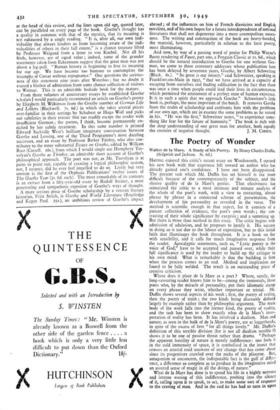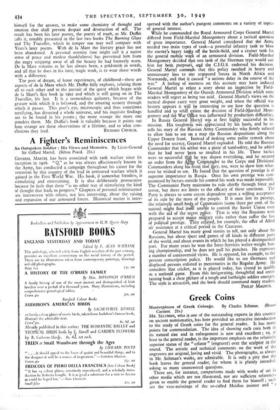The Poetry of Wonder
Walter de la Mare. A Study of his Poetry. By Henry Charles Duflin. (Sidgwick and Jackson. 8s. 6d.) HAVING enjoyed this critic's recent essay on Wordsworth, I opened his new book with that eagerness felt toward an author who has already gained one's confidence. I have not been disappointed. The present task which Mr. Duffin has set himself is the more difficult because of the contemporaneity of the subject, and the elusive quality of de la Mare's genius. That elusiveness has stimulated the critic to a most intimate and minute analysis of the whole of the poet's work, with a view to extracting, almost phrase by phrase in a connected scheme of presentation, the development of his personality as revealed in the verse. The method is scientific enough in that aspect, for it consists of a patient collection of evidence, the poet's own words ; the con- trasting of their whole significance by exegesis ; and a summing up. But there is more than method in this essay. The critic begins with admission of adulation, and he proposes to justify it. His success in doing so is not due to the labour of exposition, but to this initial faith that illuminates the book throughout. It is a book on fire with sensibility, and it calls for much imaginative response from the reader. Apocalyptic statements, such as, " Lyric poetry is the voice of God," have to be accepted and paused over, while their full significance is used by the reader to build up the critique in his own mind. What is remarkable is that the building is firm when the process comes to an end. Method and inspiration arc found to be fully welded. The result is an outstanding piece of creative criticism.
Where does it place de la Mare as a poet ? Where, surely, the long-savouring reader knows him to be—among the immortals, those poets who, by the miracle of personality, put their idiomatic stamp on every phrase they write, whether important or trivial. Mr. Duffin shows several aspects of his work ; first, the poetry of reality, then the poetry of truth ; the two kinds being discreetly defined largely by example rather than by philosophic argument. The main body of the work falls into the former kind, the poetry of reality, and the task has been to show exactly what de la Mare's inter- pretation of reality has been. It has involved a dualism. Man and nature, as seen in the bulk of de la Mare's poetry, are at loggerheads, in spite of the excess of love "for all things lovely." Mr. Duffin s definition of this terrible division (for is not all dualism terrible ?) shows it to be one of passive threat rather than drama. " Perhaps the apparent hostility of nature is merely indifference: one feels it in the cold immensity of space, it is symbolised in the insect that crosses an arterial road unaware of any change that has come about since its progenitors crawled over the rocks of the pliocene. But, antagonism or unconcern, the indisputable fact is the gulf of differ- ence, a difference so complete as to produce in the imaginative mind an assured sense of magic in all the doings of nature."
What de la Mare has done is to spend his life in a highly nervous and intense wooing of this indifference, probing into the silence of it, callhaft upon it to speak, to act, to make some sort of response to the craving of man. And in the end he has had to turn in upon
himself for the answer, to make some chemistry of thought and emotion that shall prevent despair and destruction of self. The result has been his later poetry, the poetry of truth, as Mr. Duffin calls it, notably presented in the last two books The Burning Glass and The Traveller, which in .temper one may well compare with Yeats's later poems. With de la Mare the literary grace has not been abandoned. A personal serenity (one might call it a native sense of peace and modest thankfulness) has prevented him from the angry stripping away of all the beauty he had formerly worn. De la Mare remains as he has always been, a goldsmith in words, and all that he does in his later, tragic work, is to wear those words with a difference.
The poet of dream, of lunar experiences, of childhood—these are aspects of de la Mare which Mr. Duffin fully explores, relating them all to each other and to the pursuit of the quest which began with de la Mare's first book in 1902 and which is still going on in The Traveller, his last. It is a tremendous quixotry, because of the gesture with which it is followed, and the amazing scenery through which it passes. This poet's eye, microscopic and thus sometimes terrifying, has dissected a whole universe, and his inquisite findings are to be found in his poems ; the more strange the more one ponders them. Mr. Duffin's book is valuable because it points out how strange are these observations of a lifetime, and to what con-















































 Previous page
Previous page